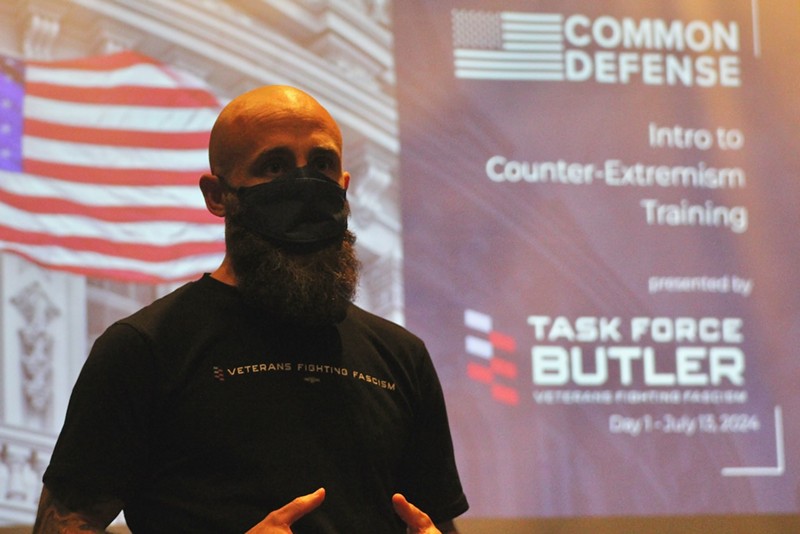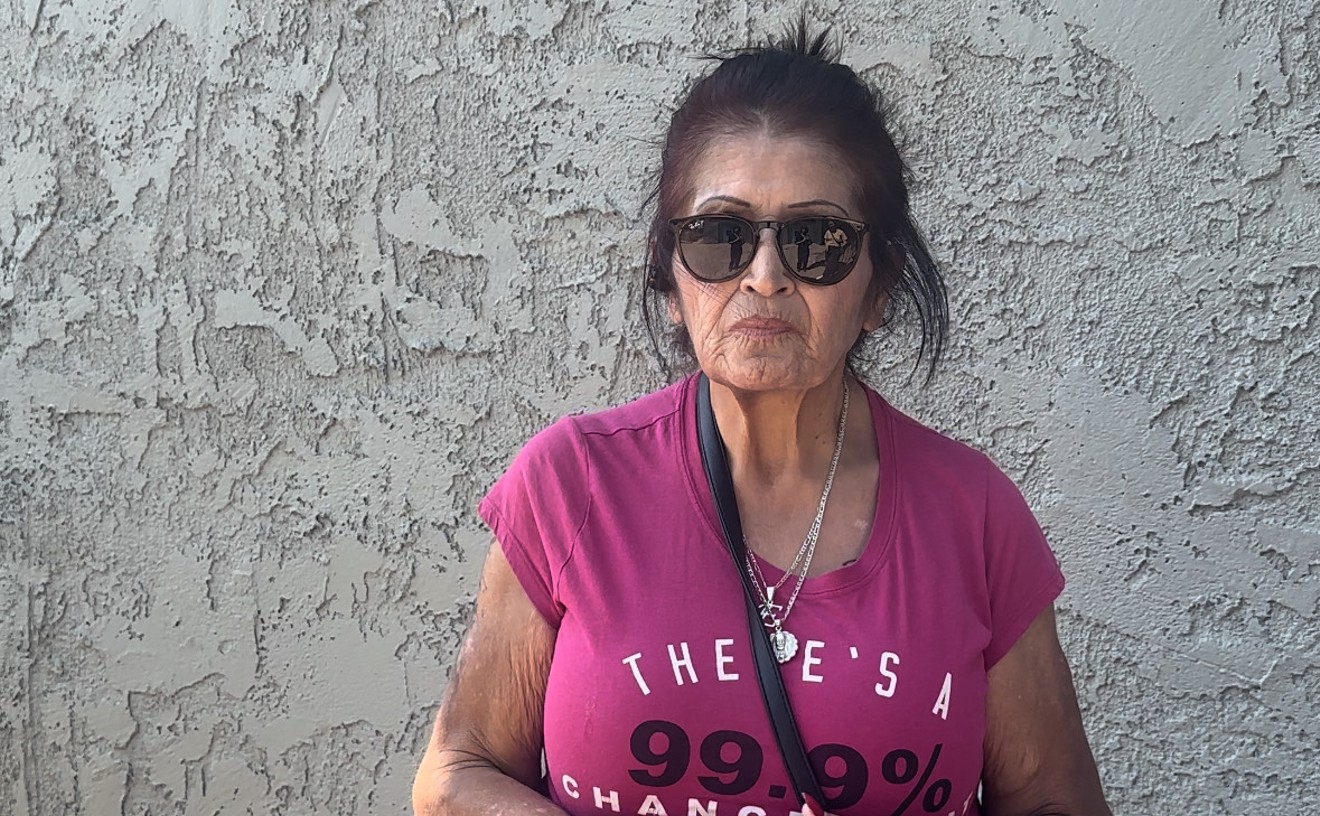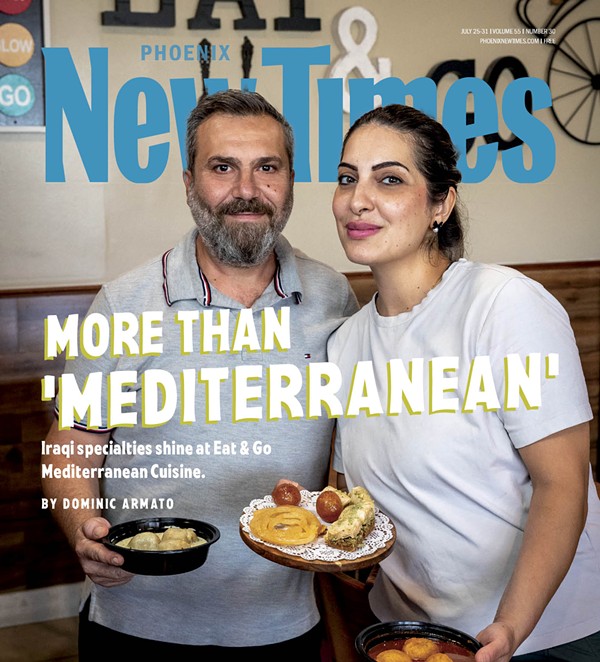So busy, in fact, that the former U.S. Army sergeant started a nonprofit to further his efforts. Task Force Butler infiltrates and researches fascist and white supremacist groups in the United States. Earlier this month, that mission brought Goldsmith to the Valley.
From July 12-13, Goldsmith led workshops for roughly 30 local veterans at the Marriott Courtyard Phoenix Downtown. He also screened a film about how extremist organizations recruit disillusioned veterans and their role in the Jan. 6 insurrection at the U.S. Capitol. A few Valley politicians joined the group to watch.
Goldsmith’s hobby-turned-mission to make life more uncomfortable for fascists began in 2020, when an Army friend told him he’d just joined the neo-Nazi group Patriot Front and wanted Goldsmith’s help to “take them down.” Goldsmith says that since then, he’s infiltrated a number of fascist organizations without great difficulty.
The main qualification for membership is depressingly simple. “They do skin checks,” Goldsmith told Phoenix New Times at the event. “So, if you’re white, you’re going to pass.” To really pass, though, requires doing a lot of depressing homework. “You have to immerse yourself in the grossest parts of the internet to understand how to talk” like avowed white supremacists, he said.
“It’s something that anyone can do,” he added. “It just sucks because you’re basically swimming in intellectual sewage in order to talk to these people.”
Goldsmith started Task Force Butler in 2022 to “help veterans get involved in fighting hate groups” like he does. Task Force Butler targets groups that fit under a number of labels — fascist, white supremacist, neo-Nazi, violent extremist — though there is plenty of overlap between them. Together, the groups form a front of “domestic extremism,” which Goldsmith defines as the belief that certain people must be excluded from society because of who they are.
The organization is named after U.S. Marine Corps Maj. Gen. Smedley Butler, the decorated military leader who warned Congress in 1933 of a fascist plot to topple President Franklin D. Roosevelt. “My interest is, my one hobby is, maintaining a democracy,” Butler said in 1934. “If you get these 500,000 soldiers advocating anything smelling of Fascism, I’m going to get 500,000 more and lick the hell out of you.”
Now Goldsmith is trying to do the same, although with far fewer than 500,000 soldiers at his back. But he’s trying to get more involved.
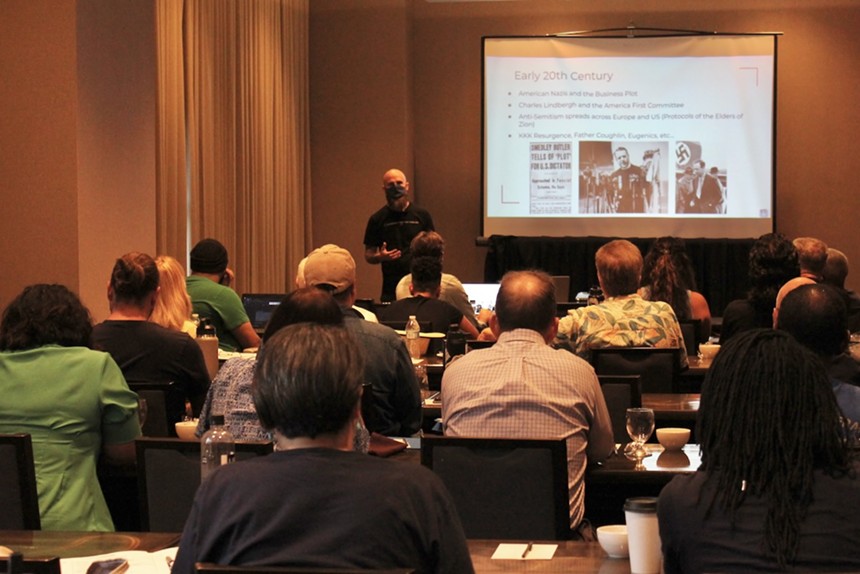
Task Force Butler founder Kris Goldsmith speaks to a room of veterans about the history of domestic extremism.
TJ L'Heureux
Making racism expensive
Task Force Butler employs a small team, though Goldsmith keeps more detailed information about its members and tactics under wraps. And it’s no wonder why. As Task Force Butler’s most public face, he frequently is being threatened and intimidated by the very people he’s working to expose.At the workshop, Goldsmith detailed the history of contemporary fascist and white supremacist organizations before teaching veterans how to combat them. He gave tips about how to collect evidence and build cases against extremist groups so they feel less free to take violent action or harass people in public or private.
Veterans can organize community responses to extremist activity, holding extremists accountable by documenting and drawing attention to what they’re doing. They also can report those groups to federal, state and local law enforcement when their tactics are illegal.
“It’s one thing to say hate is bad, racism is bad,” Goldsmith told attendees. “It’s another thing to make it expensive to be a neo-Nazi.”
The workshop was hosted by the national veterans organization Common Defense and was followed by a screening of the 2023 documentary “Against All Enemies.” In the film, Goldsmith explains how extremist organizations recruit despondent veterans longing for camaraderie and another mission. Many such organizations used military tactics to spur the mob that stormed the U.S. Capitol on Jan. 6, 2021.
The screening also was attended by Democratic congressional candidate Raquel Terán, who told attendees about her history of fighting extremists such as former Arizona Senate President Russell Pearce and former Maricopa County Sheriff Joe Arpaio.
Also present were state Sen. Anna Hernandez and congressional candidate Conor O’Callaghan, whom Common Defense has endorsed in the Democratic primary to take on Republican Rep. David Schweikert in November.
“The work Kris Goldsmith is doing with Task Force Butler to root out extremism and stop potential attacks is critically important,” O’Callaghan told New Times in a written statement. “Especially given the recent assassination attempt on President Trump, it is imperative that we stamp out all forms of political violence and hateful rhetoric that has no place in our country.”
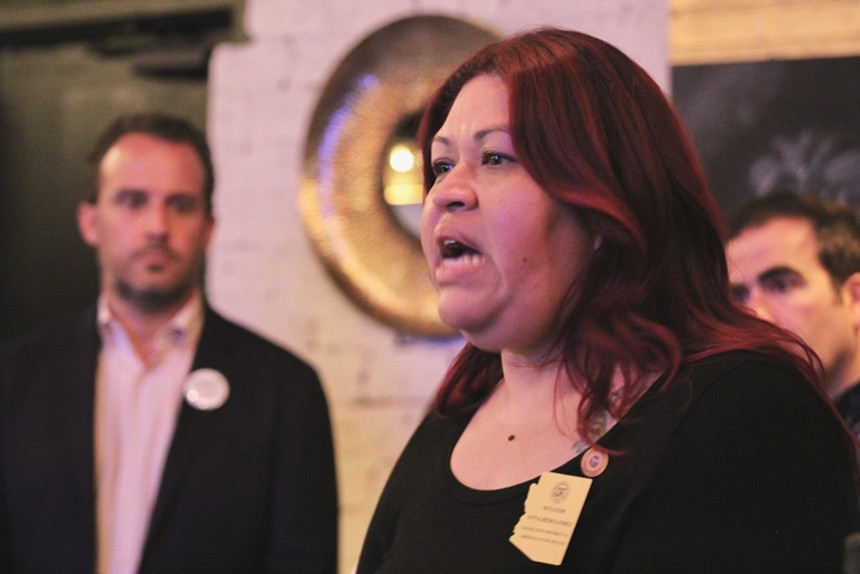
State Sen. Anna Hernandez speaks to attendees at the screening of a documentary about domestic extremism in Phoenix.
TJ L'Heureux
‘I hope that I’m wrong’
If former President Donald Trump wins a second term in November, Goldsmith warned before the attempt on the former president’s life, things could get authoritarian very quickly. He worries that the white supremacist gangs he’s been hunting for four years would operate without a leash.“I hope that I’m wrong. But I think back to November 2020 when I was working as an analyst and infiltrating Three Percent security force,” Goldsmith said in a Q&A session following the film. “I was taking videos of them discussing storming the Georgia state Capitol and threatening to kill the governor of Georgia. I was handing that directly to the FBI. None of those guys have been arrested yet.”
Though domestic extremist organizations have a long history in the U.S. — with the Ku Klux Klan being the most infamous of the groups — they’ve become more and more common since the 1980s, as Northwestern University professor Kathleen Belew highlighted in her account of the white power movement, “Bring the War Home.” More recently, a new wave has emerged in the past 10 years with the widespread use of social media.
Goldsmith highlighted the rise of what journalist David Neiwart has called “stochastic terrorism,” which essentially is a call to arms from someone with a national platform. Despite the recent attempt on his life — by a shooter whose motives have yet to be fully revealed — Trump is one of its most common practitioners. While incendiary, courts have ruled such statements to be protected speech.
“The Republican Party has endorsed the killing of American citizens,” Goldsmith said. “That’s new for our generation.”
Such extremism doesn’t always take the form of a paramilitary group. According to studies, about one in four people targeted by Libs of TikTok, the alt-right outrage machine stoking the fires of culture war, reported experiencing real-world harassment, violence or destruction of property. And though most of the violent groups run on right-wing ideology, not all of them do.
Goldsmith highlighted the emergence of what he calls “active clubs,” which are different from traditional white supremacist organizations. These clubs, such as the Rise Above Movement founded by Robert Rundo, are formed around combat sports clubs and embrace modern youth aesthetics and culture. Their focus is not on ideological purity but on the glorification of violence and street fighting. Goldsmith says their goal is to undermine faith in institutions.
New trends and challenges in countering domestic extremism are on Goldsmith’s mind, and he’s looking for partners in the fight. He’s already preparing for what he calls a worst-case scenario: a second Trump presidency.
“Democratic-run states are going to be strongholds,” Goldsmith said. “What we are going to see is a real test of federalism.”

